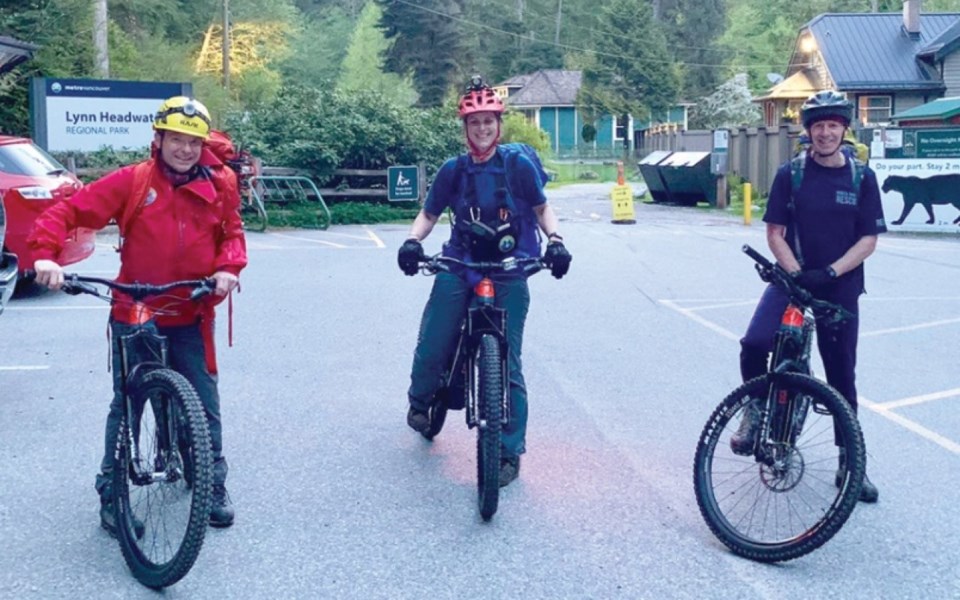North Shore Rescue volunteers are now quite literally riding to the rescue.
The team has made their first successful rescue using their new fleet of electronic bicycles, which they say will allow them to reach their bases and lost hikers faster than they could before.
Around 5 p.m. Friday, a man called 911 after getting lost in Lynn Headwaters Regional Park. He thought he'd wandered off the Varley Trail but was actually moving like "an unguided missile" into the steep bush between the Lynn Loop Trail and the Lynn Peak Trail, said Doug Pope, search manager.
Pope called the park rangers and asked them to send someone to the location while he and two other NSR members biked in via the Lynn Loop Trail.
On foot, it would have taken about an hour and a half to arrive. Thanks to the bikes, they were there in 45 minutes, Pope said.
"It was the first opportunity for us to try them out on a rescue and it was very successful," Pope said. "We were all out before dark and I think having the bikes helped contribute to getting the call done quite quickly."
As a bonus, the bikes added an element of fun for the volunteer rescuers, Pope added.
Pope said the lost man made a very common mistake in the backcountry – getting deeper into trouble by going deeper into the wilderness.
"Once you're off trail and realize that you're lost, immediately stop and think about backtracking the way you came. Don't keep going in a direction that gets you further lost," he said. "If you can't find your own way back, stop and call for a rescue."
Other rescue teams in the province have already added e-bikes to their gear, said Paul Markey, one of the NSR members who helped negotiate the partnership with Norco Bicycles and John Henry Bikes to purchase 19 e-bikes at discounted rates.
Pope said they are still working on the logistics of when and where the bikes will be most useful. But in any rescue, time is of the essence so Pope said he anticipates they will be needed on those days when North Shore traffic brings everything to a halt, making it difficult to even reach the Cap Gate and Bone Creek Search and Rescue stations.
"To get [to Bone Creek] on a Friday afternoon in rush hour, sometimes would take us over an hour and a half, just from Central Lonsdale," he said. "Now we have another option for members to beat traffic and get to the rescue base where we may have a helicopter waiting."
Last week, the B.C. Search and Rescue Association reported a 35 per cent increase in incidents compared to the same period last year. Things have been mostly quiet for North Shore Rescue volunteers since the COVID-19 pandemic began, Pope said, but the team is bracing for a high call volume when the province reopens Cypress and Seymour provincial parks.
The team was out on Thursday afternoon as well to fetch two subjects from a gully on Grouse Mountain,
Making matters more challenging is having to abide by COVID-19 protocols – screening subjects for possible exposure to the virus, keeping two metres apart from each other and making sure everyone is wearing personal protective equipment.
"We're in the new world. We have to be very careful. Along with all the other hazards rescuers face, this is another thing to layer and we're doing our best to reduce that risk," Pope said.
Because of the pandemic, North Shore Rescue has been asking hikers to keep to low-risk trails that are close to civilization, and only if you are well prepared.
This article originally appeared here.




